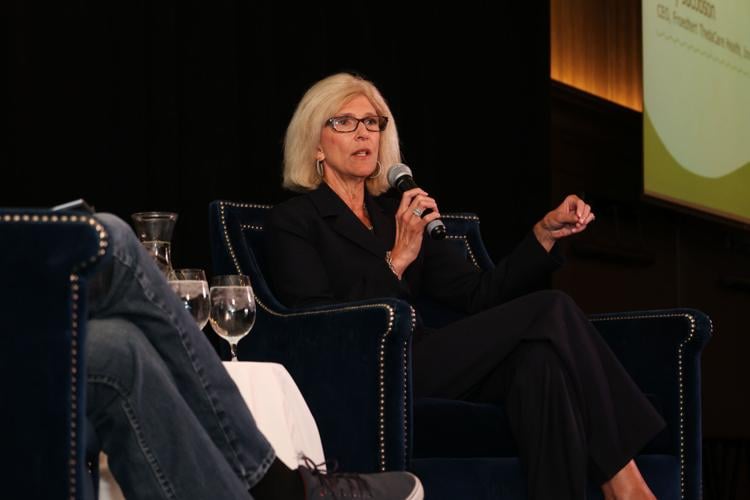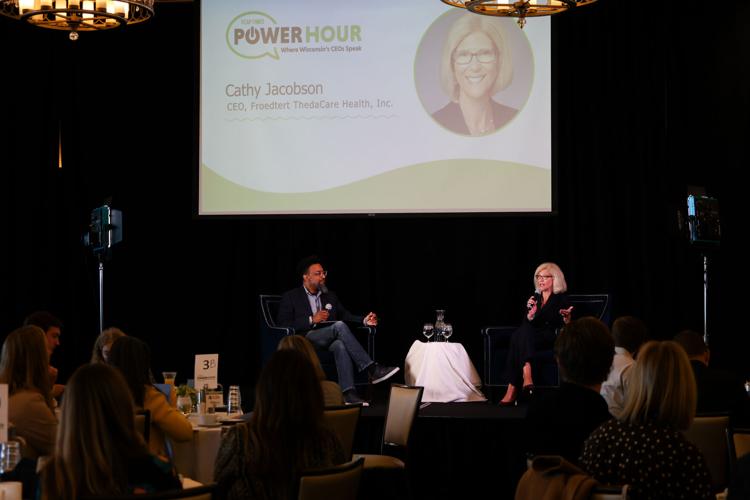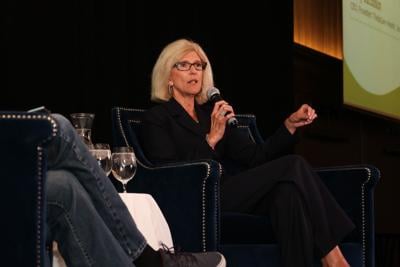The recent closing of hospitals in Eau Claire and Chippewa Falls is just the latest sign that the economics of the health care industry aren’t working, Catherine Jacobson, the CEO of Froedtert ThedaCare Health, said last Friday morning at an on-stage conversation hosted by the Cap Times at The Edgewater Hotel. The ticketed event was the latest in the Power Hour series, which features CEOs from across the state.
Jacobson wasn’t involved in the March shutdown by Hospital Sisters Health System, which sent shockwaves through the state and left Chippewa Falls without a hospital. But she told the business and community leaders gathered Friday that she can imagine what happened.
Jacobson has spent more than 30 years in hospital leadership roles in Wisconsin and Chicago. She became CEO of Froedtert Health in 2012, leading its network of hospitals and clinics in the Milwaukee area, and oversaw the system’s January merger with Appleton-based health care system ThedaCare. Jacobson will retire this summer.

Catherine Jacobson, CEO of Froedtert ThedaCare Health, speaks with moderator Mark Richardson at the Cap Times Power Hour event at the Edgewater Hotel on April 12.
In the U.S., Jacobson explained, four different parties split the cost of health care: the federal government through Medicare, state governments through Medicaid, employers through employer-provided health insurance, and patients, who pay the smallest share.
But health care leaders have long complained that Medicare and Medicaid, which make up the majority of medical care, pay far less than the true cost of care. Those reimbursements also don’t rise as fast as prices do, Jacobson said, explaining that it’s common to see Medicare reimbursements rise 1% when inflation is 3%.“The government has never kept up with the rate of inflation,” Jacobson said.
“If you think you don't have government-run health care in America, yes, you do, because it's primarily driven by the Medicare program, which gets bigger every day because this country is aging at an enormous pace,” Jacobson said.
The financial challenge is only getting worse as the population ages and more people qualify for Medicare, she said. Wisconsin is aging even faster than the rest of the country.
“You're losing money on 60% of your business, and (that share) is growing, and you have to try to make all your margin out of the rest of it, which are consumers and employers. That's the game that we've been playing for the last decade,” Jacobson said.
Those dynamics mean that only a few hospital services, including specialties like surgery, generate profit. It’s no coincidence, she thinks, that St. Joseph’s Hospital in Chippewa Falls shut down just months after suspending surgeries last September due to staffing shortages.
“I have described it as a Byzantine Jenga game. You know the big tall thing where when you start pulling stuff out it collapses? People started pulling all the stuff out that made money, and all the stuff that didn't make money stayed in that hospital,” Jacobson said.
“That’s why you’re starting to see hospitals close … The systems are starting to break.” The situation is especially precarious for rural hospitals, which have seen declining numbers of patients and a high share of Medicare- and Medicaid-eligible patients. According to the American Hospital Association, 136 rural hospitals closed between 2010 and 2021.
The financial challenge, she said, is one reason that health care systems, including her own, are increasingly acquiring additional hospitals and merging with other health care systems, creating a more consolidated industry. In some cases, those deals save hospitals money, Jacobson said.
In other cases, like with the recent merger of Froedtert Health and ThedaCare, worth a combined $4 billion, it’s about pooling resources to attract top talent. Regulators signed off on that deal, though some economists argue hospital mergers tend to increase costs without increasing the quality of care.
“We're trying to figure out how to navigate going forward,” Jacobson said of the industry. But she does see a bright side to all the money challenges: it could prompt heath care industry leaders to embrace change.
“We do move slowly in health care, and it does sometimes take financial exigency to get yourself in gear.”






